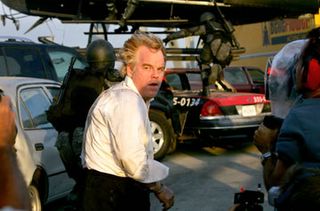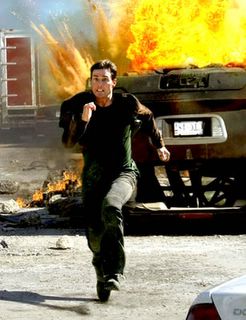Mission: Impossible III

"You got a wife? A girlfriend? A cat? I'll tell you what I'm gonna do next. I'm gonna find them, I'm gonna kill her and then I'm gonna kill you. Then I'm gonna revive her, and then I'm gonna kill the cat, right in front of her. Then, I'm gonna make a snack. Then I'm going to kill you again, just in case you weren't totally dead. Yeah, I'll kill you twice if I have to. Then, the cat and I will watch and review Mission: Impossible 3. Before I kill it, while your dead girlfriend watches."
By now, most everyone's seen the big interrogrtion scene from MI:3, J.J. Abrams addition to the little Tom Cruise franchise that could. It's the highlight of the trailers, a scene that promises to actually pump some life into what has, thus far, been a fairly uninteresting franchise. And I'll say this for Abrams, who made his name by reviving the hour-long action genre on TV with "Lost" and "Alias" - conceptually, he's made by far the most interesting Mission: Impossible movie yet.
Unlike De Palma's stylish but overly confusing first entry, that abandoned the "team effort" aspect of the narrative altogether in favor of paranoia thriller trappings, Abrams has made a film that's far more clearly inspired by the television show. It's about a team pulling a variety of bizarre or improbable heists and covert actions, and it has a real lively sense of good humor and fun. And unlike John Woo's shrill and overblown second chapter, it's not trying so hard to impress the audience with gadgetry and swooning slow-motion romance, and it remembers that the explosion-heavy action set pieces must always take a backseat to the sheer invention and ingenuity of the mission.
There's a lot that J.J. has done right. He's finally made Mission: Impossible an emotional, human story. The narrative doesn't feel like some thin excuse for Tom Cruise to show off his biceps and jump off of buildings (although, of course, there's still ample time for both), but actually tries to create characters who exist in a universe of real stakes and consequences. And though his movie's less cinematic or aesthetically pleasing than De Palma's or Woo's, Abrams has focused more on sheer entertainment value. It's chaotic and cartoonish, yes, but Mission: Impossible III doesn't get lost in pumped-up, navel-gazing star vehicle territory. It's about hiring a big cast of stars, flying them around the world, blowing lots of shit up and having a good time.
Perhaps the greatest achievement of J.J.'s version is its simplicity. Rather than allowing extensive exposition and convoluted spycraft to bog down what should be a light, enjoyable affair, J.J. has designed a neatly-interlocking structure with just enough plot to provide the adventures with a framework. The result is a spy film that's a lot more Michael Bay than John Le Carre, and that's probably more appropriate for an adaptation of "Mission: Impossible."
Everything revolves around a series of kidnappings. Ethan Hunt (Cruise) and a newly-assembled team of IMF agents (Ving Rhames, returning from the first movie, along with newcomers Jonathan Rhys-Meyers and Maggie Q) venture to Berlin to save an agent trained by Hunt (Keri Russell) from the hands of sadistic arms dealer Owen Davian (Hoffman).
When that goes awry, they are tasked by the head of IMF (an angry Laurence Fishburne) with capturing Davian himself. And when their quarry escapes and kidnaps Ethan's new wife (Michelle Monaghan, whom I first admired in Kiss Kiss Bang Bang), it's time for yet another rescue mission. It's all well thought out and tightly paced, and this sort of loose strucutre allows Abrams to take the film all over the world, from Germany to Italy to China, without all the travel and exoticism feeling forced.
Unfortunately (and you knew this unfortunately was coming), Abrams ideas work a lot better conceptually than they actually do on screen. I'm sure a lot of M:I3's shortcomings are due to the fact that this is Abrams first feature film. Starting your career as a movie director by working on a big-budget summer sequel starring and produced by Tom Cruise has got to be nerve-wracking to say the least. The fact that the film has an idiosyncratic, personal vision in the first place is a testament to Abrams ability to organize and keep everything in balance.
But it's hard to excuse some of the lapses here, if only in terms of visual storytelling, style and cinematography.
To put it simply, Abrams isn't very good at directing action sequences. There are a number of problems with the big set pieces in the film, which include a helicopter chase through windmills, a shootout with helicopters and planes on a bridge and a raid on a Shanghai office building that really earns the title "Mission: Impossible." Abrams falls back on that most obnoxious of Hollywood action cliches, the jiggly spastic camera.
As soon as bullets start flying or cars speeding, throughout the entire movie, Abrams stops allowing the camera to sit still for a moment. I honestly have no idea how a Shaky-cam effect is supposed to improve these action scenes. It makes it harder to see what's going on, and though for a moment it may seem like things are moving faster than the really are, the final effect is highly disorienting. Which is the last thing you want for the entirety of an action sequence.
I mean, maybe you want things to be disorienting for a moment, to give the audience a feel for the main character's perspective. If you were really running away from missiles on a bridge, being thrown into cars and leaping over gaping, charred holes in the asphalt, everything probably would look chaotic and blurred and shaky. But if you employ this effect for the entire sequence, everything just comes out unclear and confusing, and you miss what otherwise would probably be an exciting sequence.
Beyond just the pointless, jittery cinematography, Abrams action sequences lack geographical sense or perspective. We're never quite sure where people are in relation to one another. Sometimes, it seems like Ethan Hunt is running right in front of a row of mercenaries firing machine guns at him, and yet he never gets hit. Other times, it seems like characters are right next to one another, and then we discover they are on opposite sides of the room. And during the helicopter chase near the film's beginning, it's unclear even which helicopter has the good guys and which has the bad guys. Because Abrams shots don't give you any sense of depth, you can't see who is chasing who.
That's a considerable problem. Abrams has set up these spectacular, creative set pieces only to fumble the execution.
His writing and character work faces a similar problem. A lot of the situations in the film have juicy set-ups that, if well-written, would have provided for the most intense drama of any of the Mission: Impossible films thus far. Take the interrogation scene between Hoffman and Cruise that I goofed on at the start of this review. It's the first thing we see in the movie, and it's a truly evil bastard rattling off to the film's hero all the horrible, nasty things he's planning to do. That's a terrific way to start an action movie, particularly one that follows up two other films in which the main character is essentially invincible.
For the first time, Ethan Hunt actually faces not just a death-defying stunt, but real human pain. He could lose his wife, not just his job or some top secret documents. And in Philip Seymour Hoffman, Abrams has chosen an actor who can exude real menace. The guy didn't win Best Actor for nothing - he's one of the finest character actors working in Hollywood today.
And though the scene works okay, it's never really takes off the way it should. Davian, overall, is a pretty disappointing, flat character when all is said and done. He's all bluster. He talks a lot about torturing and killing people, but we never really see him do anything all that villainous. And the end that Abrams has devised for him at the film's conclusion is extremely anti-climactic. Hoffman got a better send-off in Brett Ratner's Red Dragon, and if you can't top Brett Ratner, you officially got problems.
Cruise, likable though he may be, isn't really in the same class. Hoffman takes a barely-written character and turns in an interesting performance with a lot of nice little asides. Cruise is center-stage the entire film and his Ethan Hunt still barely registers as a character. At this point in his career, he's become as much a brand as an actor. Mission: Impossible 3 finds him falling back on msot of his predictable patterns. Anyone know why his movies always include scenes with him running down long corridors or hallways? I only ask because he has kind of a funny-looking run. He's not bad in the film, just predictable.
Ving Rhames, always a likable, charismatic presence in this kind of ensemble, tries his best to give tech expert Luther some spark, but Abrams and co-screenwriters Alex Kurtzman and Roberto Orci have saddled him with this really corny sub-plot about not wanting Ethan to get married. He's also stuck with the bulk of the film's unfunny one-liners.
I liked the dynamic that Abrams was giving Luther and Ethan - two friends who have worked together for years and seen some incredible and tragic things together - but, as written, the scenes just don't play. Luther's a dud, kind of a depressing wet blanket, despite Rhames' best efforts. Rhys-Meyers and Maggie Q barely register at all - it's nice that Abrams has bothered to give Hunt a team, and the sequences with them all coordinating crazy operations together are fun, but he clearly didn't put a lot of work into fashioning three-dimensional characters for these two terrific actors. The only scene with just these two characters, in which they discuss an old prayer Maggie Q's character used to say for her lost cat, is an embarrassingly obvious attempt to give them some added screen time.
So, yeah, I bet M:I3 was great on paper. A faster, leaner, more outrageous and original addition to a series of films that has never quite found its voice or identity. And I wouldn't count Abrams out completely as a feature director. There's promise and genuine enthusiasm riddled throughout this film, which is admirable for its ambition and epic size. Abrams, based only on this movie (I have never seen his TV shows) strikes me as the kind of guy with the raw materials to do great things, big but not mindless popcorn entertainments, but who was possibly overwhelmed by such a grandiose undertaking the first time out.
That, or he's just a better producer/idea man than he is a writer/director. I can't be sure.

1 comment:
Lons,
Although Abrams isn't involved in the day-to-day writing and directing anymore, you should still check out Lost if you get a chance. At least wait till season 2 comes out on DVD in a couple months and watch both seasons in a weekend orgy of entertainment. It is engrossing, funny, intelligent, spooky, and just about everything else that makes for good television. Hell, at this point, it's one of the best movies I've ever seen, it just happens to be 33 hours long and counting.
Post a Comment